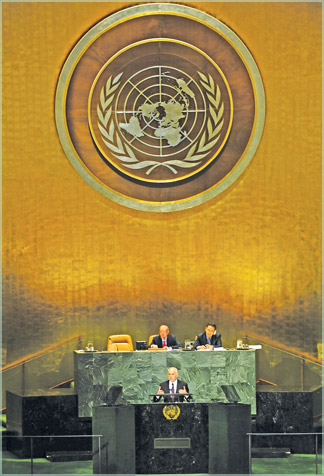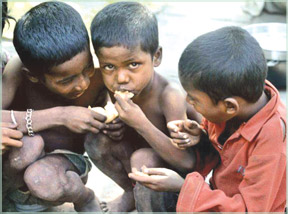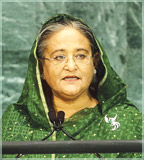Can Millennium Development Goals be saved?
Shashi Tharoor
The world knows it is not on course to meet those goals, the target
date being 2015. The time has come to reinforce Goal 8, its capstone.
The target date for fulfilling the Millennium Development Goals (MDG) is
2015, and the world knows it is not on course to meet those goals. So
world leaders are set to gather at the United Nations (New York,
September 20-22) to undertake a comprehensive review, with the aim of
agreeing on a roadmap and a plan of action to get to the MDG finishing
line on schedule.
|

Greece’s Prime Minister George Papandreou addresses the
Millennium Development Goals Summit at the United Nations
headquarters in New York, September 20, 2010. AFP |
I was at the UN in September 2000, when world leaders met at the
Millennium Summit and pledged to work together to free humanity from the
‘abject and dehumanizing conditions of extreme poverty,’ and to ‘make
the right to development a reality for everyone.’ These pledges include
commitments to improve access to education, health care, and clean water
for the world’s poorest people, abolish slums, reverse environmental
degradation, conquer gender inequality, and cure HIV/AIDS.
|

An estimated 1.4 billion people were still living in extreme
poverty in 2005, and the number is likely to be higher
today. File photo |
It’s an ambitious list, but its capstone is Goal 8, which calls for a
‘global partnership for development.’ This includes four specific
targets - “an open, rule-based, predictable, non-discriminatory trading
and financial system”, special attention to the needs of least-developed
countries, help for landlocked developing countries and small island
states, and national and international measures to deal with developing
countries’ debt problems.
Basically, it all boiled down to a grand bargain - while developing
countries would obviously have primary responsibility for achieving the
MDGs, developed countries would be obliged to finance and support their
efforts for development.
This hasn’t really happened. At the G-8 summit at Gleneagles and the
UN World Summit in 2005, donors committed to increasing their aid by $50
billion at 2004 prices, and to double their aid to Africa from 2004
levels by 2010. But official development assistance (ODA) last year
amounted to $119.6 billion, or just 0.31 percent of the developed
countries’ GDP - not even half of the UN’s target of 0.7 percent of GDP.
In current US dollars, ODA actually fell by more than two percent in
2008.
The UN admits that progress has been uneven, and that many of the
MDGs are likely to be missed in most regions. An estimated 1.4 billion
people were still living in extreme poverty in 2005, and the number is
likely to be higher today, owing to the global economic crisis. The
number of undernourished people has continued to grow, while progress in
reducing the prevalence of hunger stalled - or even reversed - in some
regions between 2000-2002 and 2005-2007.
About one in four children under the age of five are underweight,
mainly due to lack of quality food, inadequate water, sanitation, and
health services, and poor care and feeding practices. Gender equality
and women’s empowerment, which are essential to overcoming poverty and
disease, have made at best fitful progress, with insufficient
improvement in girls’ schooling opportunities or in women’s access to
political authority.
Progress on trade has been similarly disappointing.
|

Mikheil Saakashvili. AFP |
Developed country tariffs on imports of agricultural products,
textiles, and clothing - the principal exports of most developing
countries - remained between five percent and eight percent in 2008,
just two-three percentage points lower than in 1998.
|

Sheikh Hasina. AFP |
The time has come to reinforce Goal 8 in two fundamental ways.
Developed countries must make commitments to increase both the quantity
and effectiveness of aid to developing countries. Aid must help
developing countries improve the welfare of their poorest populations
according to their own development priorities. But donors all too often
feel obliged to make their contributions ‘visible’ to their
constituencies and stakeholders, rather than prioritizing local
perspectives and participation.
There are other problems with development aid. Reporting requirements
are onerous and often impose huge administrative burdens on developing
countries, which must devote the scarce skills of educated,
English-speaking personnel to writing reports for donors rather than
running programs. And donor agencies often recruit the best local talent
themselves, usually at salaries that distort the labour market. In some
countries, doctors find it more remunerative to work as translators for
foreign-aid agencies than to treat poor patients.
The Hindu |



